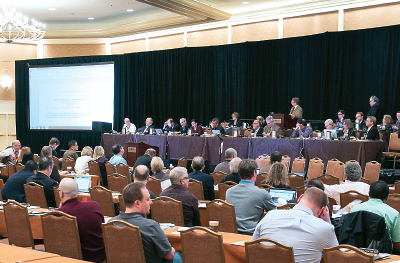Confronting a wide range of issues that focused on various aspects of patient care, representatives to the APA Assembly voted to approve more than a dozen key proposals at their fall meeting in Washington, D.C. In addition, the meeting included two special events: Former APA President Steven Sharfstein, M.D., was
presented with the Assembly’s Profile of Courage Award, and Paul Burton, M.D., chief psychiatrist at San Quentin Prison in California, talked about the national shame of criminalizing people with mental illness.
“The criminalization of people with mental illness is a misguided public policy that is expensive, unproductive, unhelpful, and flat-out wrong,” said APA Assembly Speaker Glenn Martin, M.D., in an interview. “It helps neither mentally ill people nor the public. Dr. Burton’s presentation was an eye-opening, moving, tour de force. It serves as an excellent introduction to the theme of the APEX awards and Dr. Renȳe Binder’s focus as president of APA.”
The APEX awards are new awards that APA and the APA Foundation plan to present each year at a special program to recognize outstanding achievements in public policy, public education, and innovative community-based work that benefit people with mental illness. The program for 2016, known as the Stepping Up National Summit, will bring national attention to the issue of the incarceration of mentally ill people. It will be held at the Mayflower Hotel in Washington, D.C., April 17 to 19. (More information will appear in Psychiatric News early next year.)
Assembly Acts on Opioid Epidemic
Assembly members voiced strong support for a proposed APA position statement titled “Opioid Overdose Education and Naloxone Distribution (OEND),” which was developed jointly with the American Academy of Addiction Psychiatry. This statement, which calls opioid overdose deaths a public-health crisis that shows no signs of abating, endorses greater use of an established program—the OEND program—that trains patients on how to use the opioid antagonist naloxone and how to prevent and quickly respond to an opioid overdose by using naloxone kits to reverse the overdose. Those who use opioids and those in their environments who may witness an overdose can be trained to use the kits. The Food and Drug Administration has approved an autoinjection device that contains naloxone, and the proposed position statement cites research findings that use of these injectors by lay first responders is associated with reduced overdose mortality.
In another action on the topic of opioid addiction, representatives passed a paper calling for APA to have discussions with the Accreditation Council for Graduate Medical Education (ACGME) and its Residency Review Committee (RRC) to encourage them to include training of residents in general adult psychiatry programs in the use of buprenorphine to treat opioid addiction. The paper says that at this time, most programs “do not require their trainees to complete the buprenorphine waiver training and waiver certification paperwork. This represents a critical missed opportunity to train tomorrow’s psychiatrist to meet the demands of the growing opioid use disorder epidemic. …”
Also on the residency training front, the Assembly is calling on APA to urge the ACGME and RRC to “recognize and incorporate training in partial hospitalization and other intermediate levels of care” in the organization’s section on curriculum organization and resident experiences and says that such training is “an important elective clinical experience for psychiatry residents,” but one that too few psychiatry residents receive.
Assembly Calls for Change to Medicaid Practices
The Assembly also addressed a concern regarding the need for a method to pay for prescriptions for Medicaid patients that are ordered by psychiatrists who are treating them but do not participate in Medicaid. The action paper points out that more payers are implementing policies that bar prescription payments ordered by such nonparticipating psychiatrists. When this occurs, the paper notes, patients “must disrupt their relationship with their longstanding psychiatrist and find one of the few [Medicaid] participating psychiatrists to prescribe medications.” The Assembly is urging APA to seek legislators or health officials who are willing to sponsor legislation or regulations that will require psychiatric prescriptions be paid for regardless of whether the treating physician participates in the Medicaid program.
Regarding another Medicaid-related concern, the Assembly voted to urge the staff of the APA Council on Advocacy and Government Relations, through the Association’s expanded state government structure, to advocate that states that have not yet done so expand their Medicaid programs to include more uninsured Americans living in poverty. The Affordable Care Act provides additional federal funding for states that expand their Medicaid eligibility to people earning up to 133 percent of the federal poverty level, but 20 states have decided against doing so.
Advocates of this expansion maintain that such a move would make psychiatric care for seriously and persistently mentally ill individuals more accessible and perhaps reduce the numbers incarcerated for minor offenses. The proposal states as well that “APA will continue to address workforce and other access concerns in relation to expected increased demand for services stemming from Medicaid expansion.”
The need to expand access to care was also the topic of a paper the Assembly passed urging APA to collaborate with other medical societies, including the AMA and the American Urological Association, to take steps leading to “a full range of evidence-based pharmaceutical, mechanical, and surgical treatment options for dealing with erectile disorder in a cost-effective manner.” Interventions other than corrective surgery, the most expensive option, are excluded from Medicare coverage, for example, under the theory that federal tax dollars should not be spent on interventions that address “lifestyle” rather than strictly medical issues.
The Assembly’s proposal notes that erectile disorder is included in DSM-5 “when the dysfunction is not explained by a nonsexual mental disorder, severe relationship distress, other significant stressor, [or] the effect of a substance/medication or another medical condition. …” The Assembly is hoping that APA and its allies on this issue can convince Congress to pass legislation that would allow Medicare to begin covering a range of treatments for the disorder. ■
APA members may access past summaries of actions taken by the Assembly
here.

